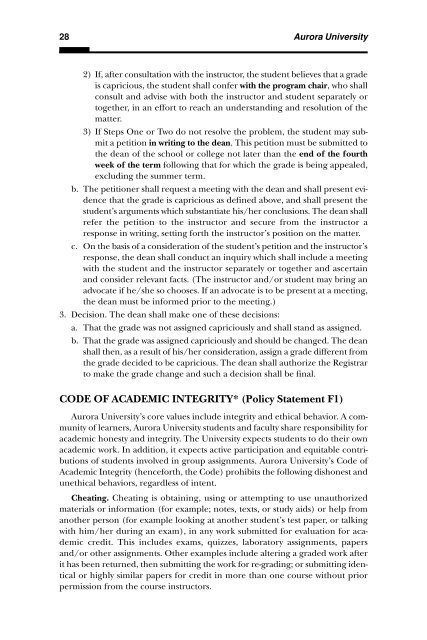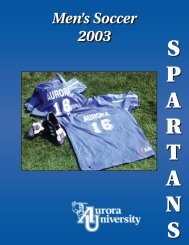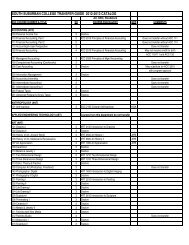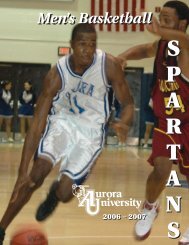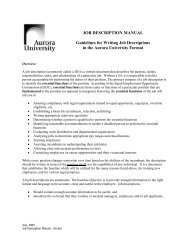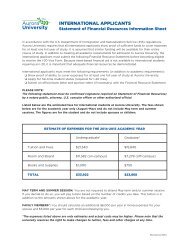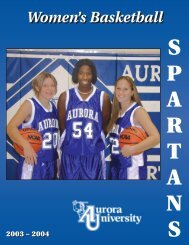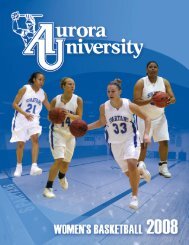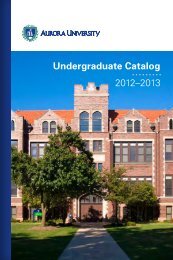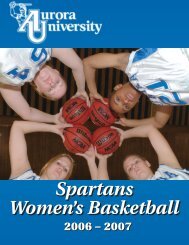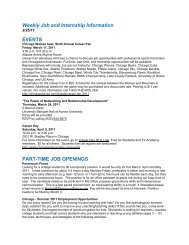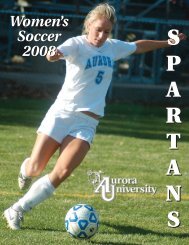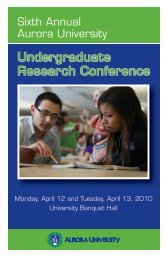Grad Catalog 09-11.indd - Aurora University
Grad Catalog 09-11.indd - Aurora University
Grad Catalog 09-11.indd - Aurora University
Create successful ePaper yourself
Turn your PDF publications into a flip-book with our unique Google optimized e-Paper software.
28 <strong>Aurora</strong> <strong>University</strong><br />
2) If, after consultation with the instructor, the student believes that a grade<br />
is capricious, the student shall confer with the program chair, who shall<br />
consult and advise with both the instructor and student separately or<br />
together, in an effort to reach an understanding and resolution of the<br />
matter.<br />
3) If Steps One or Two do not resolve the problem, the student may submit<br />
a petition in writing to the dean. This petition must be submitted to<br />
the dean of the school or college not later than the end of the fourth<br />
week of the term following that for which the grade is being appealed,<br />
excluding the summer term.<br />
b. The petitioner shall request a meeting with the dean and shall present evidence<br />
that the grade is capricious as defined above, and shall present the<br />
student’s arguments which substantiate his/her conclusions. The dean shall<br />
refer the petition to the instructor and secure from the instructor a<br />
response in writing, setting forth the instructor’s position on the matter.<br />
c. On the basis of a consideration of the student’s petition and the instructor’s<br />
response, the dean shall conduct an inquiry which shall include a meeting<br />
with the student and the instructor separately or together and ascertain<br />
and consider relevant facts. (The instructor and/or student may bring an<br />
advocate if he/she so chooses. If an advocate is to be present at a meeting,<br />
the dean must be informed prior to the meeting.)<br />
3. Decision. The dean shall make one of these decisions:<br />
a. That the grade was not assigned capriciously and shall stand as assigned.<br />
b. That the grade was assigned capriciously and should be changed. The dean<br />
shall then, as a result of his/her consideration, assign a grade different from<br />
the grade decided to be capricious. The dean shall authorize the Registrar<br />
to make the grade change and such a decision shall be final.<br />
CODE OF ACADEMIC INTEGRITY* (Policy Statement F1)<br />
<strong>Aurora</strong> <strong>University</strong>’s core values include integrity and ethical behavior. A community<br />
of learners, <strong>Aurora</strong> <strong>University</strong> students and faculty share responsibility for<br />
academic honesty and integrity. The <strong>University</strong> expects students to do their own<br />
academic work. In addition, it expects active participation and equitable contributions<br />
of students involved in group assignments. <strong>Aurora</strong> <strong>University</strong>’s Code of<br />
Academic Integrity (henceforth, the Code) prohibits the following dishonest and<br />
unethical behaviors, regardless of intent.<br />
Cheating. Cheating is obtaining, using or attempting to use unauthorized<br />
materials or information (for example; notes, texts, or study aids) or help from<br />
another person (for example looking at another student’s test paper, or talking<br />
with him/her during an exam), in any work submitted for evaluation for academic<br />
credit. This includes exams, quizzes, laboratory assignments, papers<br />
and/or other assignments. Other examples include altering a graded work after<br />
it has been returned, then submitting the work for re-grading; or submitting identical<br />
or highly similar papers for credit in more than one course without prior<br />
permission from the course instructors.


